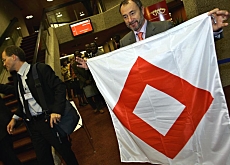
New Red Cross emblem leaves bitter taste

The signatory states to the Geneva Conventions have approved a new emblem for the Red Cross movement after a stormy three-day meeting in Switzerland.
The Swiss government said it was betrayed by a number of Middle East countries after adoption of the “red crystal” had to be put to a vote rather than accepted by consensus.
The vote in the early hours of Thursday morning followed three days of often bitter wrangling in Geneva.
The emblem was finally adopted by a two-thirds majority in the face of opposition from mainly Arab and Muslim countries.
Hopes of consensus disappeared following the failure of last-ditch negotiations to resolve differences between Israel and Syria over humanitarian access to the Golan Heights.
Swiss diplomats, who spent nine months negotiating an agreement on the red crystal, said they were satisfied with the result but made it clear that it left a bitter taste in the mouth.
“We are in a way satisfied that the protocol has been adopted very clearly but we are disappointed that this was not done by consensus,” Didier Pfirter, Switzerland’s special envoy on the emblem issue, told swissinfo.
“We made a tremendous effort to achieve this result by consensus. We did all we could and went to the limits of what was humanly possible.”
Pfirter said the Swiss were forced to put the issue to a vote to prevent a humanitarian conference being “taken hostage” by politics.
Blaise Godet, Swiss ambassador to the United Nations in Geneva, added that once it became clear that there was no way of closing the gap, a vote was the only option.
Hopes raised
Adoption by consensus of a third emblem – in addition to the red cross and red crescent – appeared to be on course last week when the Israeli and Palestinian emergency services signed a groundbreaking accord in Geneva.
This was seen as clearing the way for a deal this week, which would also allow Israel’s Magen David Adom (MDA) to join the International Red Cross and Red Crescent Movement.
MDA has been isolated for more than 50 years because it has refused to use either of the two recognised symbols, opting instead for a red Star of David. In future, it will be able to place its own symbol inside the red crystal.
It was thought that the agreement with the Palestinians had softened Islamic countries’ hardline opposition towards any accommodation of Israel within the movement.
But the absence of a similar deal between the Israelis and the Syrians led to an eleventh-hour hardening of their position – much to the deception of the Swiss.
“We were promised by several countries, both myself, at ministerial level and Mrs Calmy-Rey, that if the Palestinian issue were solved to the satisfaction of the Palestinians they would not oppose the adoption of this protocol. Some of these countries have voted no this evening,” said Pfirter.
An offer late on Wednesday by Swiss Foreign Minister Micheline Calmy-Rey to act as a facilitator between MDA and the Syrian Red Crescent Society failed to prevent the situation deteriorating.
Positive move
The president of the Swiss-run International Committee of the Red Cross, Jakob Kellenberger, agreed that consensus would have been the ideal outcome but denied that the emblem would be weakened as a result.
He said adoption of a third emblem was still “extremely positive”, adding that it would strengthen humanitarian law and bring universality of the Red Cross a step closer.
But Syria’s ambassador to the UN in Geneva, Bashar Ja’afari, said the meeting had been a “golden opportunity wasted” and he criticised Switzerland’s handling of the conference.
“Such a conference would have needed more preparation in order to achieve consensus, and this has not been the case – it came far too soon,” he told swissinfo.
He also condemned the fact that a matter of international humanitarian law had been “imposed” on a minority of countries by the majority.
swissinfo, Adam Beaumont in Geneva
Switzerland is the depositary state of the Geneva Conventions.
98 countries voted in favour of the emblem, 27 against, with ten abstentions.
Most of those opposing the third additional protocol were members of the Organisation of Islamic Countries.
Iran, China, North Korea and Cuba also voted against the red crystal.

In compliance with the JTI standards
More: SWI swissinfo.ch certified by the Journalism Trust Initiative




























You can find an overview of ongoing debates with our journalists here . Please join us!
If you want to start a conversation about a topic raised in this article or want to report factual errors, email us at english@swissinfo.ch.